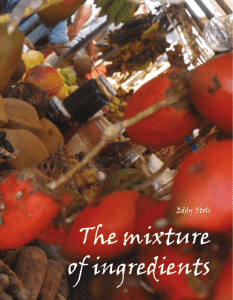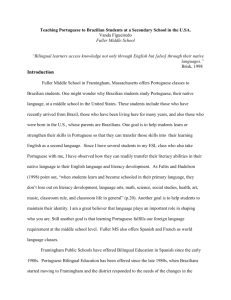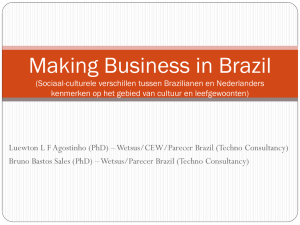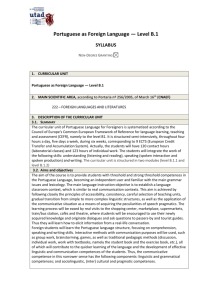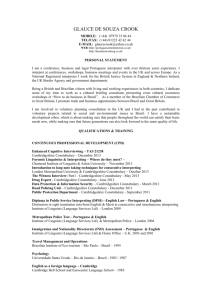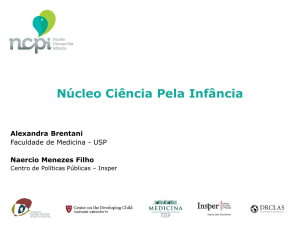Liliane Santos Powerpoint
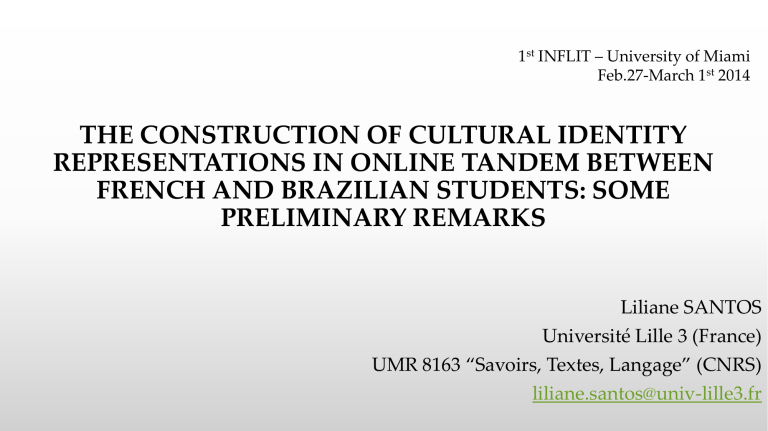
1 st INFLIT – University of Miami
Feb.27-March 1 st 2014
THE CONSTRUCTION OF CULTURAL IDENTITY
REPRESENTATIONS IN ONLINE TANDEM BETWEEN
FRENCH AND BRAZILIAN STUDENTS: SOME
PRELIMINARY REMARKS
Liliane SANTOS
Université Lille 3 (France)
UMR 8163 “Savoirs, Textes, Langage” (CNRS) liliane.santos@univ-lille3.fr
1. Introduction
• Teletandem Brasil (TTB)
• Lille 3 (Portuguese Dept. + CRL) & Unesp (Assis)
• 2006-2007
• (partial) autonomy
• Lille 3 students: learning logbook (LLB) + report
• data analysis
2. Corpus
• 32 reports and LLB (2006-2012)
263 TTB sessions;
• 111 emails;
• 47 notes (informal conversations).
3. Analysis
3.1. Brazil: the prominent topic
• comments about the topics: 54.3%
• comments about Brazil: 33.4%
• 98.6%
sessions in Portuguese
(1) during the sessions, I realized that when we started to speak in Portuguese, we automatically treated topics about Brazil. (SR)
• the French students interest for Brazil and Brazilian culture
(2) the [teletandem] sessions correspond to what I wanted to learn, because as I already have a good level in Portuguese, I wanted to know more about the
Brazilian culture. (AR)
(3) I don’t know much about Brazil, and having some information about this country by someone who lives there is very interesting to me. (SB)
• introducing more precise elements
(4) on January, there is another [party], to party the three kings arrival after Christmas. People dance also, but they walk in front of every house with a flag (with a saint’s image), we say that this flag protects the house. (VB)
(5) We both like music a lot, so we talked about music. I know a Brazilian music band called Tribalistas, and R. know it too.
So we talked about their songs. And after, she made me know a band that was well known on hippys’ times, it’s a band that was born in the 1970’s. It’s the band that she likes the most, and now I like it too. Its name is “Os Mutantes”
(LR).
• showing to the partner the cultural aspects that they consider to be positive
(6) B. talked me about Raul Pompeia, her favorite author.
(…) I talked her about Molière, my preferred author. (MC)
3.2. Possible conflicts
• multiple late arrivals and absences
(7) the [first] partner that I had didn’t respect any appointment, I have pardoned him many times, but when I saw that my friends progressed with their
Brazilian partners, I decided to change my partner. (RA)
(8) I wasn’t happy because my partner made me wait and she never showed. (GN)
• the non respect of the reciprocity principle
(9) since our first session I asked what were her goals, but she didn’t answer, in spite of my insistence. I talked about my difficulties in learning Portuguese, but she didn’t pay much attention. During the second session, I tried to talk about our goals once again, but, once again, she changed the subject and didn’t answer. (SR)
(10) one of the fundamental teletandem principles was not respected: the reciprocity (…) it seemed to me that my partner did not put as much effort as I did. (…)
Time negotiation, that is the fact of indicate that we have to begin to change languages, was always my responsibility, as well as the fact of finishing the sessions. My partner did not seem much concerned about time (also she was always late) (…) it was difficult to me to know at each session if we were going to work on what I had prepared during the hour in
French and during the hour in Portuguese too. (SR)
• how (10) continues
(11) I had the impression that she thought I was too orderly and by consequence too strict. (SR)
3.3. Overcoming the difficulties
• the “partner’s behaviour”: good relationship
(12) I learned to know a very nice person, whom I will continue to talk with even if our teletandem is finished. (ACD)
(13) I appreciate my partner’s advises because she doesn’t judge me when I don’t know something and she helps me.
(JMA)
(14) our conversation was based in a real exchange. (VB)
(15) my partner was patient; she didn’t hesitate to repeat or to write some entire sentences that I didn’t understand when I heard her. (MR)
(16) my partner was very nice, with whom I talked well and with whom we always had something to say. We always had questions to ask and answers to give, I liked so much this experience. (HT)
• the difficulties may function as a trigger for a reflection about the teaching and learning process
(17) I learned a lot. In fact, I had a double difficulty: being able to construct my own learning path (my role as an apprentice) asking to my partner’s advice, and being able to advise her about her learning path (my role as a tutor). (NP)
• some difficulties may function as a trampoline to a more profitable learning
(18) we began [our partnership] during the Brazilian
[summer] holidays, my partner didn’t have access to the
University equipment, mainly the webcam. So, we had to contact each other only in writing, by MSN until the start of classes in Brazil, for my partner didn’t have a webcam in her place neither. I think, though, that this allowed us to contact little by little, without being in direct visual contact. It also allowed us to work on the written language, moreover on the orthography. (NP)
• when the partner is a beginner
(19) [she] began to learn French this year. That’s why she never spoke French. But the last time we talked, she spoke French. It was simple but interesting questions. I helped her the same way she helped me with
Portuguese (What is your name?, your birthday?). (HT)
• the student’s maturity (level of studies, age)
(20) Enrolled in the 2 nd year of a professional Master, I am not a schoolchild anymore, but a worker in continuous training. (…) This position allowed me to help my partner and to be more confident (…) in any case, I tried to encourage her the best I could. (NP)
• the student’s international or intercultural experience
(21) I (…) was born in France and (…) I lived in Portugal during the major part of my childhood and my adolescence. (…) Having lived in both countries, I knew the difficulties that we can have to face when learning another culture. (AD)
• the partner’s professional experience
(22) she knew exactly how to help me, because, being a teacher, she knew the methods to show a foreign language. (JA)
• the establishment of a close and trustful relation between the partners
(23) Me and M., we have a very good relationship. He’s a very nice fellow, and he respects me. (…) He does everything to send me documents and it is reciprocal.
(…) I help him too to construct his sentences. (…) M. is a good partner, mature and patient. (FD)
• how to avoid a trap: the difficulty raised by the fact of assuming a position according to with the origin of all our problems leans on the other.
3.4. Identity, language and culture
• “ Portugal”: a marginal topic (3.4%)
• nearly a third of the French students are from Portuguese origin
• generally third generation
• they interacted about Brazil with Brazilian students, and these students interacted with them, as French, about
France
• a tenuous relation to Portugal and to the Portuguese culture?
• their claimed Portuguese origin
a conflict:
as French: attracted by the Brazilian culture (Lima-Pereira,
2010)
as Portuguese-descendants: an ambiguous relationship with it (Gomes, 1998; Lisboa, 2008)
• these students’ relationship with the country of their parents and grand-parents is precisely the axis around which the relationship between the three cultures is build.
• to speak Portuguese may have a double function:
(i) an identity individual marker, when France is considered
(ii) a collective and affective marker, when Portugal is considered
“I was born in France, I don’t speak Portuguese, but I am
Portuguese”
“the language may be lived as an identity marker, but the identity affirmation does not necessarily go along with the practice of this language. So we must to establish a clear distinction between the practice of a language and the relationship to this same language, which coincides with the connection with their country of origin”. Rey & Van den Avenne (1998, p. 123)
• the more successful interactions take place between the ones who maintain an appeased relationship with their own identity, whether French, Portuguese or Brazilian
• being Portuguese: ambiguous feelings towards Brazil
• being Brazilian: mixed feelings toward Portugal and
France:
superiority vs. inferiority
• a small corpus
4. Final considerations
• “the pragmatic aspects of the interaction (and mainly those of the interaction at a distance) are those that may present the higher levels of difficulty to the learners”.
(Santos, 2009, p. 155)
• to learn interactive strategies that are different from those of one’s own culture
• to confront different ways of acting and thinking
• to know (or to deepen the knowledge on) cultural elements, like the customs and traditions of the partner’s country
• only those who face peacefully their own cultural identity are able to maintain successful linguistic and cultural exchanges, without any feeling of superiority or inferiority, whether cultural, historical, economical or ideological.
References
GOMES, A. N. (1998) “Um amor de 500 anos: irmandade e ambiguidade nas relações entre Brasil e
Portugal”.
Oficina do Centro de Estudos Sociais, n° 116, 1998.
Available at http://www.ces.uc.pt/publicacoes/oficina/ficheiros/116.pdf
(access on 2011.Dec.15).
LIMA-PEREIRA, (2010) “R. Les médias et les clichés sur le Brésil: entre synthèse culturelle et sirène d’appel aux études universitaires en France”. Revista Pós Ciências Sociais, vol. 7, n° 14, pp. 173-189.
Available at http://www.periodicoseletronicos.ufma.br/index.php/rpcsoc/article/viewFile/571/325
(access on 2012.Jan.15).
LISBOA, W. T. (2008) “Reminiscências coloniais e sentidos midiáticos: a identidade brasileira em
Portugal”.
Perspectivas de la Comunicación, vol.
1, nº 2, pp.
30-38.
Available at http://www.perspectivasdelacomunicacion.cl/revista_2_2008/parte2_03.pdf
(access on 2012.Jan.15).
REY, V. & VAN DEN AVENNE, C. (1998) Langue et identité en situation migratoire: identité ethnique, identité linguistique. À chacun son bambara. In: CABEZA PEREIRO, C., LORENZO
SUÁREZ, A. M. & RODRIGUEZ-YANEZ, X. P. (eds.). Comunidades y indivíduos bilingües: Actas do I
Simposio Internacional sobre o Bilingüismo. Vigo: Universidad de Vigo, pp. 120-131. Available at http://webs.uvigo.es/ssl/actas1997/01/Rey.pdf
(access on 2009.May.14).
SANTOS, L. Ensino e aprendizagem de Português para Estrangeiros in tandem em contexto virtual: primeiros passos de um Projeto franco brasileiro. In: SANTOS, L. & SIMÕES, D. (orgs.). Ensino de
Português e Novas Tecnologias. Rio de Janeiro: Universidade Estadual do Rio de Janeiro/Dialogarts, pp. 147-160, 2009. Available at http://www.dialogarts.uerj.br
(acces on 2010.Jan.04).


